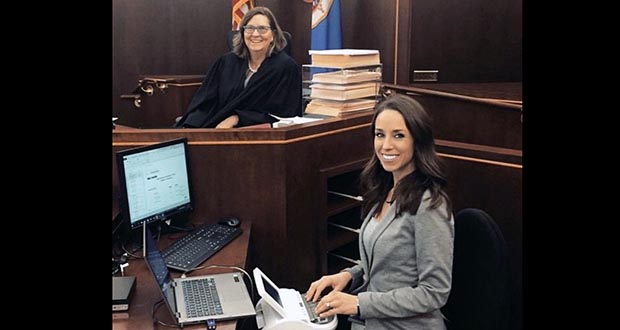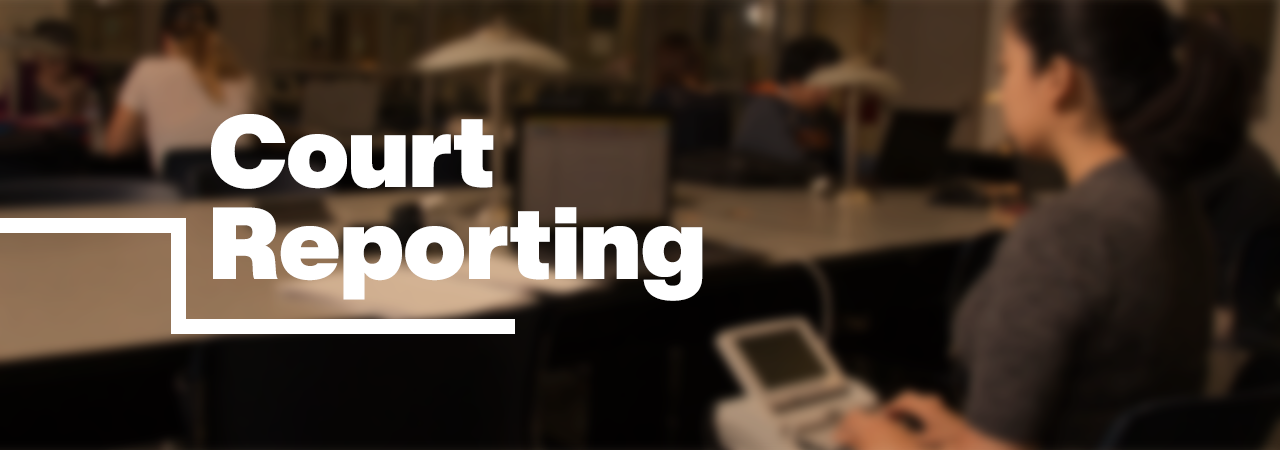Durham court reporting services: types you can request
Comprehending Court Reporting: An Overview of Its Duty in the Legal Process
Court reporting is an essential element of the lawful system. It guarantees that every spoken word during depositions and trials is properly transcribed. This transcription provides a reputable document for future referral. Stenotype reporter possess specialized skills and must browse numerous technologies. durham court reporting. As the lawful landscape advances, so too does the duty of these professionals. Understanding their impact elevates important concerns regarding the future of lawful documentation and liability
The Significance of Accurate Transcription in Legal Process

Accurate transcription plays a vital duty in legal procedures, functioning as the foundation for justice and responsibility. Court press reporters, charged with recording spoken discussion throughout trials and depositions, guarantee that every word is documented with accuracy. This transcription becomes a crucial document, permitting judges, courts, and lawyers to examine the process precisely. Errors or noninclusions in transcription can cause misconceptions, misconceptions, and potentially unjustified outcomes.
These transcripts offer as main documents that can be referenced in future legal actions, charms, or scholarly evaluations. The honesty of the judicial procedure counts greatly on the dependability of these records. The capability to provide a clear, verbatim account of disagreements and statements is important in supporting the policy of legislation. As a result, the relevance of exact transcription can not be overemphasized; it is necessary for guaranteeing reasonable trials and preserving public rely on the legal system.
The Skills and Credentials of Court Reporters
While the duty of a stenotype reporter is important in the lawful system, it needs a distinct collection of qualifications and abilities to assure efficient efficiency. Proficiency in shorthand or voice writing is essential, enabling reporters to capture talked language precisely and effectively. Furthermore, a strong grasp of legal terminology and procedures is necessary, as stenotype reporter must comprehend complex discussions that happen during hearings and trials.
Additionally, interest to information and phenomenal listening abilities are needed to guarantee accurate records. Numerous stenotype reporter possess certification from accredited programs, which typically consist of rigorous training in transcription methods and lawful values. Strong social abilities additionally play a considerable role, as press reporters often interact with attorneys, witnesses, and judges. Inevitably, the mix of technological efficiency, lawful expertise, and interpersonal capabilities equips court reporters to accomplish their responsibilities effectively within the judicial system
Different Types of Court Reporting Solutions
Court reporting solutions incorporate a variety of specialized features tailored to satisfy the demands of the legal system. One popular kind is deposition reporting, where court reporters record witness testaments outside of court settings, often for usage in tests. An additional service is real-time reporting, which gives instant transcription throughout procedures, allowing lawyers to gain access to online text feeds. Additionally, some court press reporters supply transcription of audio and video recordings, making sure exact documentation of events.
Closed captioning services are likewise provided, decriminalizing proceedings obtainable to individuals with hearing disabilities. Additionally, lots of court reporting firms specialize in serving certain lawful areas, such as family members regulation, criminal law, or business law, thereby supplying customized competence. Some press reporters might supply video deposition services, which improve the documentation procedure with visual context. Each kind of solution plays an important duty in making certain the accuracy and integrity of lawful documents.
The Innovation Behind Modern Court Reporting
Modern court reporting counts heavily on innovative technology to enhance accuracy and performance. Stenography devices, electronic recording strategies, and real-time transcription software program are essential parts of this field. These devices not just assist in the transcription process yet likewise assure that legal proceedings are recorded with accuracy.
Stenography Machines Explained
Stenography equipments act as the foundation of modern court reporting, transforming talked words right into composed message with exceptional effectiveness. These specialized devices make use of a distinct keyboard design that enables stenotype reporter to kind syllables and words phonetically, enabling them to record dialogue at high speeds. Making use of shorthand symbols suggests that reporters can record conversations in actual time, guaranteeing exact documents of lawful process. Stenography makers are furnished with innovative modern technology, including software that can convert stenographic notes into readable message. This integration of hardware and software substantially boosts the rate and accuracy of court reporting, making it an indispensable tool in the legal area. As a result, stenography stays an essential skill for experts in the court room.
Digital Recording Techniques
Improvements in innovation have expanded the tools available for court reporting past traditional stenography equipments. Digital recording techniques have become a trustworthy choice, recording sound and video of lawful proceedings with high integrity. These systems make use of microphones and recording gadgets purposefully placed to guarantee clarity and reduce history noise, providing a comprehensive record of testaments and discussions. The recorded content can be played back for accuracy throughout transcription, permitting court reporters to verify information successfully. In addition, digital recordings can be kept securely for future reference, improving ease of access and protecting the honesty read here of the lawful process. As courts welcome these modern-day innovations, electronic recording techniques play a progressively critical role in keeping efficient and accurate documentation.
Real-Time Transcription Software Application
As courts significantly take on modern technology to improve the lawful process, real-time transcription software application has actually ended up being a necessary tool for stenotype reporter. This cutting-edge technology allows stenotype reporter to record talked discussion promptly, providing instant access to accurate records throughout procedures. By transforming talked words into text as they are spoken, real-time transcription software application facilitates efficient interaction between attorneys, my latest blog post judges, and other court individuals. The software often integrates with courtroom audio systems, guaranteeing that every word is caught with precision. Furthermore, it can create transcripts for review and distribution, improving the documentation process. Consequently, real-time transcription software application not just improves the performance of court reporting yet also enhances the general access of legal process.
The Duty of Court Reporters in Keeping Courtroom Integrity

Additionally, stenotype reporter add to the transparency of the judicial process. By supplying detailed transcripts, they enable the public and media to access court proceedings, fostering accountability. Their presence in the courtroom also aids keep etiquette, as their activities highlight the seriousness of the legal procedure.
In enhancement to technological skills, stenotype reporter should exhibit professionalism and reliability and impartiality, vital for preserving the integrity of the judicial system. Inevitably, their attentive efforts support reasonable test legal rights and reinforce public self-confidence in the lawful framework.
The Future of Court Reporting in an Evolving Legal Landscape
As the legal landscape advances, court reporting deals with considerable changes driven by technical improvements and a growing change towards remote solutions. These advancements are reshaping just how stenotype reporter run, affecting both the speed and precision of legal documents. The future of this occupation will likely depend upon its versatility to these emerging fads.
Technological Advancements Influencing Reporting
Various technical developments are improving the landscape of court reporting, ushering in a brand-new era of performance and accuracy. Digital taping systems have actually ended up being you can try these out commonplace, enabling accurate audio capture throughout proceedings. These systems commonly integrate with transcription software program, helping with faster turn-around times for records. Additionally, expert system is playing a considerable duty in streamlining the transcription process, with speech acknowledgment technology helping press reporters in producing much more exact documents. Additionally, cloud-based storage space remedies enhance ease of access, allowing lawyers to recover and share transcripts quickly. As these innovations continue to advance, they assure to additional transform the court reporting occupation, improving the general lawful procedure while preserving high requirements of professionalism and integrity.
Shift In The Direction Of Remote Providers
The lawful landscape is significantly welcoming remote solutions, improving exactly how court reporting is carried out. This shift has been accelerated by technical improvements and the requirement for versatility during recent international occasions. Court press reporters now utilize video clip conferencing systems to assist in depositions and hearings, enabling better access and performance. Remote services enable participation from numerous areas, decreasing travel prices and logistical difficulties. Additionally, electronic transcription tools enhance precision and improve the documentation procedure. As the legal sector adapts, stenotype reporter are required to establish new abilities and familiarize themselves with arising innovations. This advancement provides both opportunities and difficulties, pushing the career towards an extra integrated, technology-driven future while maintaining its core commitment to providing precise and trusted legal paperwork.

Often Asked Concerns
Exactly How Much Do Court Reporters Normally Gain Every Year?
Court reporters generally gain in between $50,000 and $100,000 every year, relying on experience, area, and the demand for solutions. Specialized abilities or accreditations can additionally increase their gaining potential in various legal settings.
What Is the Ordinary Period of Court Reporting Training Programs?
Court reporting training programs usually last in between 18 months to 2 years. This duration differs based upon the establishment and the specific curriculum, including both concept and functional abilities vital for aiming stenotype reporter.
Can Court Reporters Job Remotely for Legal Procedures?
Yes, court reporters can function from another location for lawful process, making use of technology to transcribe audio and video feeds. This flexibility allows them to provide accurate documentation while keeping the honesty of the lawful procedure.
What Is the Difference In Between a Stenotype Reporter and a Clerk?
A court press reporter focuses on recording legal procedures, while a stenographer focuses on shorthand creating for various contexts, including conferences and meetings. Both functions include recording talked words however vary in their particular applications and settings.
Are Court Reporters Required to Have Licenses or qualifications?
Yes, court press reporters are normally needed to get qualifications or licenses. These credentials assure they have the required skills and understanding to precisely transcribe legal proceedings, maintaining the integrity of the judicial process.
Numerous court reporters possess qualification from recognized programs, which often consist of extensive training in transcription methods and legal ethics. One popular kind is deposition reporting, where court reporters transcribe witness statements outside of court setups, often for use in trials. As courtrooms significantly take on technology to improve the lawful procedure, real-time transcription software application has ended up being an important tool for court reporters. Yes, court reporters can function remotely for lawful procedures, making use of innovation to transcribe sound and video clip feeds. A court reporter specializes in recording lawful proceedings, while a clerk focuses on shorthand composing for different contexts, including meetings and conferences.